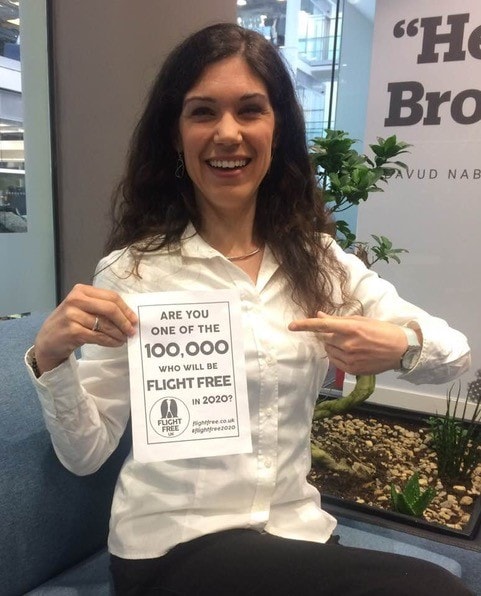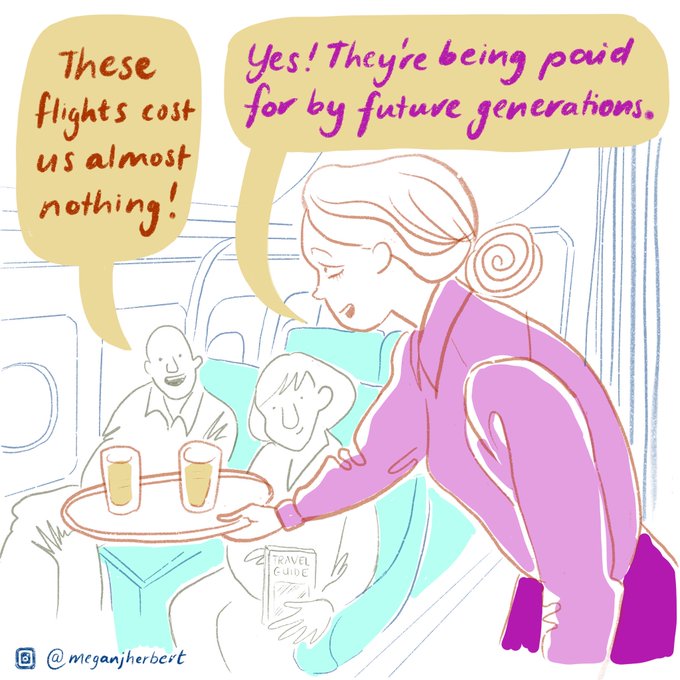
I recently published a piece in The Conversation in which I argued that the academic sector needs to address its carbon footprint from air travel.
Some of the following comments and interactions made me reflect further, so these thoughts are shared here.
Some people asked how relevant academic air travel is – surely it only makes up a small proportion of all global air travel, and only a very small proportion of total global emissions?
In one way, these are fair points – after all, the proportion of academics in the population is small. However, it is equally true that, on average, academics have much higher carbon footprints from air travel than most other people because they fly much more often (currently the average UK person only has 0.5 leisure flights a year while most academics fly several times per year).
Air travel is one of the fastest increasing sources of emissions globally, so it is about reversing that trend and changing cultures that drive it. Surely people who contribute a lot to driving such cultures should take responsibility for changing it?
Air travel is one of the fastest increasing sources of emissions globally, so it is about reversing that trend.
This is a stance I have adopted myself – I haven’t flown for the last 12 years, apart for one emergency flight for a family funeral in Germany, and a flight to Beijing for a month-long fellowship. I have signed the Flight Free 2020 pledge and intend to keep this up in the future.
As an academic and someone with family and friends in Germany, there would be plenty of reasons for me to fly. I moved to the UK in 2005 to take up my first lecturing job and initially continued to fly back home several times a year, as well as to international conferences.
For me, the turning point came in 2007 when I learnt more about the severity of the climate crisis and about the carbon footprint of different activities. I was shocked by the fact that just one flight can make the single largest contribution to one’s annual carbon footprint. I felt strongly that I had a responsibility to keep my carbon footprint as low as possible, and that it would be highly inconsistent to continue to fly while my work focused on climate change mitigation.
I still attend conferences and meetings where they are close enough that I can travel without flying, and use online facilities to present at or attend more international workshops. My holidays are in Europe where I can travel by train and/or boat.
I felt it would be highly inconsistent to continue to fly while my work focused on climate change mitigation.
Several people commented on The Conversation piece that online conferencing cannot replace face-to-face meetings. I agree, meeting people face-to-face is much richer than meeting people online – but what exactly makes the difference? We can easily learn about new topics and get feedback on a presentation at online conferences. Yes, interaction with groups might still be more difficult online than in person, but it is often the contacts that are followed up one-on-one after a conference that are productive for future collaborations.
I suspect the main thing that cannot be replicated through online conferencing is the time spent socialising with colleagues – the drink receptions, and dinners and other social activities that are often integrated into the conference programme. These activities are not only the “fun” part of conferences and meetings, but they also help build closer bonds with existing colleagues and create new ones – often by chatting about many things other than our academic work! A reduction of flying for conference attendance may hence limit our ability to create lasting international networks, and we need to think further about possible implications and remedies.
What about the feasibility of train travel for academic conferences and research? Some people commented on The Conversation piece that their lives are simply “too busy” to be able to travel by train where they would usually go by plane.
It is a fair point to say that beyond a certain distance, train travel does become impractical. For instance, while my former PhD student Roger Tyers recently demonstrated it is possible to do a UK-China fieldwork trip by train, this is unlikely to catch on because such journeys are extremely long, complicated and tiring (not to mention also more expensive due to unfair pricing mechanisms that put air travel at an advantage).
However, in my experience, train journeys that only last up to a day are perfectly manageable. If the journey becomes part of the trip, not just a means to get to a destination as quickly as possible, it can even be seen as “productive” time – reading, working on a laptop, etc. You can be more focused on a train than in the office where there are often too many distractions.
Train journeys that only last up to a day are perfectly manageable if the journey becomes part of the trip.
Furthermore, should we not start to question the “productivity culture” that pressures us to use each minute as effectively as possible and to cram as many activities into ever shorter time periods? Are we not often just keeping busy without thinking about what we should prioritise and what the real purpose of our activities are? And how does this busyness affect our mental and physical wellbeing?
I personally sympathise here with the idea that our societies will need to “slow down” to become more sustainable, because accelerated, productivity cultures feed into economic growth which, as I have argued elsewhere, is detrimental for climate change.
Our societies will need to “slow down” to become more sustainable, because accelerated, productivity cultures feed into economic growth.
My final point of reflection relates to the wider picture of how a reduction of air travel might change our societies. The availability of cheap and fast long-distance travel has facilitated globalisation, migration and cultural diversity. I do worry that values and practices of cosmopolitanism, inclusiveness and diversity might weaken in a world with less global travel.
It is therefore important to ask how these values and practices can be supported in a low or zero carbon way. We would need to ask how effective our journeys abroad really are in promoting them (how many tourists truly engage with local cultures etc. of the countries they visit?), and how we can promote them in the places we currently live.
Certainly, most cities around the globe are very multicultural places, but are we currently making sufficient effort to engage with the different cultures, languages, etc. that are so close by where we live?




